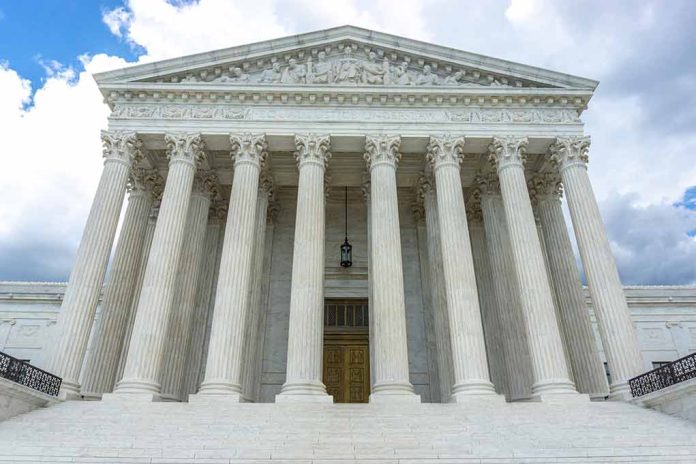
The Supreme Court delivers a landmark 9-0 victory for thousands of disabled veterans, removing the six-year time limit on retroactive combat-related special compensation claims and potentially unlocking significant back pay for those who served.
Key Takeaways
- The Supreme Court unanimously ruled that the federal six-year statute of limitations doesn’t apply to retroactive combat-related special compensation claims, overturning previous restrictions.
- Thousands of veterans nationwide, especially those with PTSD and delayed disability ratings, can now claim benefits dating back to when their entitlement began, regardless of when they applied.
- The case centered on Iraq War veteran Simon Soto, who was previously denied full retroactive payments for his PTSD resulting from handling human remains during his service.
- Over 9,000 veterans previously limited by the six-year restriction may now pursue additional tax-free benefits they’ve earned through their service.
- The Court ruled that the CRSC statute provides its own authority to settle claims, exempting it from the Barring Act’s limitations.
Justice for Veterans: Supreme Court Removes Time Barriers
In a powerful affirmation of veterans’ rights, the Supreme Court unanimously ruled on June 12 that combat veterans seeking retroactive special compensation are not bound by the standard six-year federal statute of limitations. The 9-0 decision in Soto v. United States overturns previous restrictions that had prevented thousands of disabled veterans from receiving their full entitled benefits. This ruling specifically addresses Combat-Related Special Compensation (CRSC), a tax-free benefit designed for veterans whose disabilities resulted directly from combat situations.
Justice Clarence Thomas authored the Court’s opinion, explicitly stating, “We hold that it does, and thus that the settlement procedures and limitations established under the Barring Act do not apply to claims for CRSC payments.” This decisive language effectively removes arbitrary time restrictions that had previously denied veterans compensation they had rightfully earned through their service. The decision reflects a rare moment of complete agreement on the Court and represents a significant victory for the military community.
One Soldier’s Fight Benefits Thousands
The case originated with Simon A. Soto, an Iraq War veteran who developed severe PTSD after being assigned to “search for, recover, and process the remains of war casualties.” Soto described the horrific nature of his duties, which included processing “over 300 pieces of five or seven soldiers.” His trauma led to a 100% disability rating from the Department of Veterans Affairs, qualifying him for CRSC payments. However, when he applied in 2017 for retroactive benefits dating back to 2008, the Navy limited his compensation to just six years, citing the Barring Act’s time restrictions.
“The CRSC statute is just such a law. It authorizes the Secretary of the military department to determine eligibility and calculate the amount payable. The Barring Act therefore does not apply,” wrote Justice Ketanji Brown Jackson in the Court’s opinion.
Refusing to accept this limitation, Soto filed a class action lawsuit in 2017 representing himself and thousands of similarly affected veterans. A federal district court initially ruled in his favor in 2021, but the Federal Circuit reversed that decision earlier this year. Now, the Supreme Court has definitively sided with Soto and veterans nationwide, reinstating their right to full retroactive compensation regardless of application timing.
Wide-Reaching Impact for Military Families
This ruling has profound implications for an estimated 9,000+ veterans who were previously denied full retroactive CRSC payments due to the six-year limitation. The decision is particularly beneficial for three groups: veterans with delayed VA disability ratings, those who were unaware of their CRSC eligibility, and those who faced administrative delays in processing their applications. Each of these veterans can now potentially claim compensation dating back to when their entitlement actually began.
“The U.S. Supreme Court ruled unanimously on June 12 that a federal law’s six-year statute of limitations that often applies in military-related claims does not apply to retroactive claims for combat-related special compensation (CRSC).”
CRSC provides critical financial support to veterans whose disabilities directly resulted from armed conflict, hazardous duty, training exercises that simulate war, or injuries caused by instruments of war. Unlike regular retirement pay, CRSC benefits are completely tax-free, making them particularly valuable for veterans struggling with service-connected disabilities. Veterans who believe they may be entitled to additional retroactive payments under this new ruling should review their claims, potentially with legal assistance to navigate the process effectively.
A Victory for Military Justice
President Trump has consistently championed expanded benefits and support for veterans throughout his administration. This Supreme Court decision aligns perfectly with his commitment to ensuring veterans receive the care and compensation they’ve earned through their sacrifices. The ruling represents a significant correction to a system that had been unfairly limiting benefits based on arbitrary timelines rather than actual service and entitlement, bringing long-awaited justice to thousands who served their country in combat situations.
The case’s legal foundation centered on the interpretation of two conflicting statutes: the Barring Act (31 U.S.C. § 3702), which generally imposes a six-year limitation on claims against the government, and the CRSC statute (10 U.S.C. § 1413a), which authorizes military department secretaries to determine eligibility and payment amounts. The Court concluded that Congress intended the CRSC statute to operate independently of the Barring Act’s limitations, effectively prioritizing proper compensation for combat veterans over procedural time restrictions.














